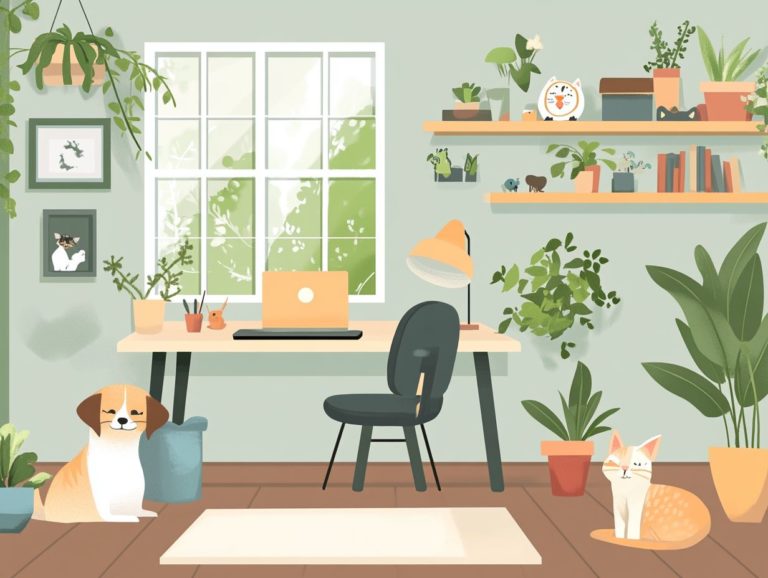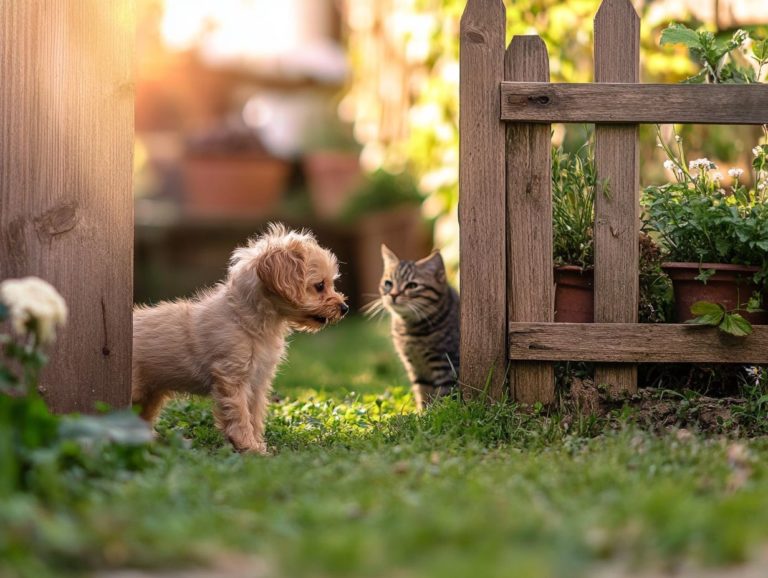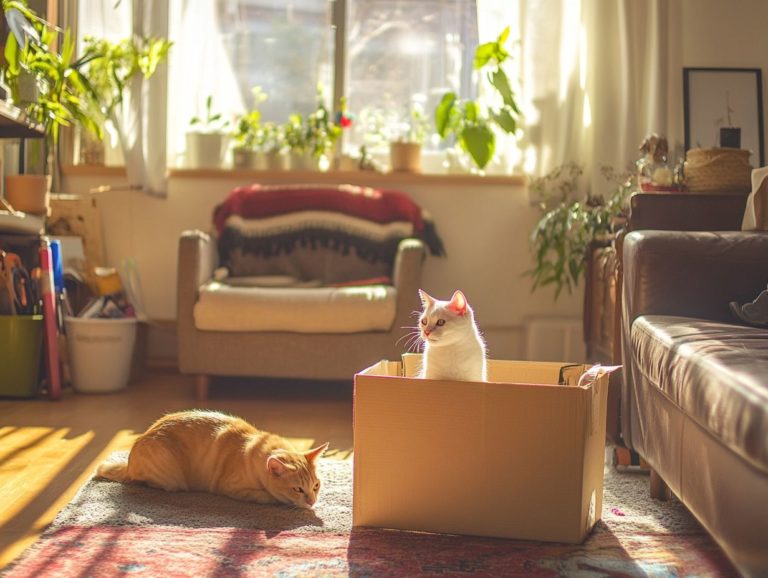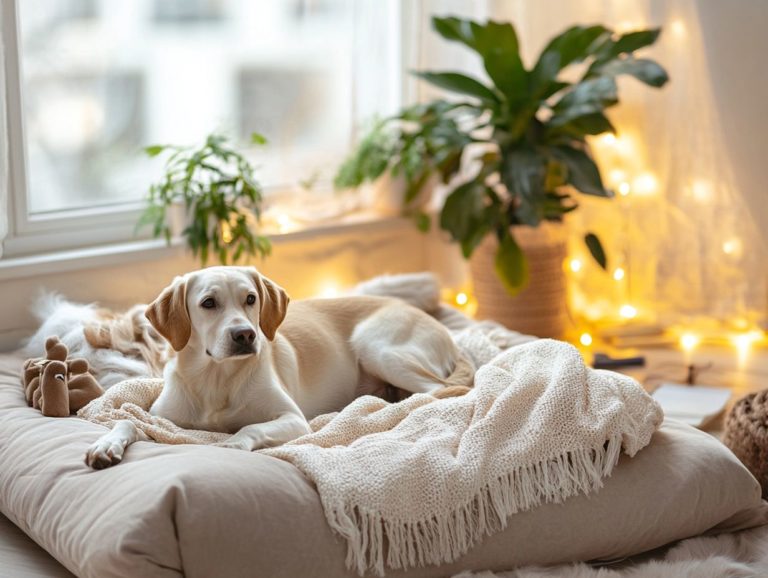5 Tricks to Calm Pets During Loud Events
Dealing with loud events can be a challenge for your furry friends, often leaving them anxious and scared. Whether it’s a thunderstorm, fireworks, or a bustling party, your pets may struggle to cope with sudden noise, especially during occasions like the Fourth of July.
This guide explores five effective tricks to help calm your pets during these overwhelming moments. From creating a safe haven to incorporating soothing sounds and consulting professionals, including a dog trainer, you’ll discover practical strategies to keep your beloved companions relaxed and secure.
We will also explore the reasons behind pet anxiety, including noise sensitivity, and share tips for preparing them for future loud events. Read on to ensure your pet feels safe and loved, no matter how much noise surrounds them.
Contents
- Quick Tips to Calm Your Pet:
- 1. Create a Safe and Comfortable Environment
- 2. Use White Noise or Soothing Music
- 3. Introduce Calming Supplements or Treats
- 4. Try Distraction Techniques
- 5. Consult with a Professional
- What Causes Pets to Become Anxious During Loud Events?
- Frequently Asked Questions
- What are some common loud events that can cause anxiety in pets?
- How can I prepare my pet for a loud event?
- What are some natural remedies for calming pets during loud events?
- Are there any training techniques that can help calm pets during loud events?
- What should I do if my pet is still anxious during a loud event?
- Can I use sedatives to calm my pet during a loud event?
Quick Tips to Calm Your Pet:
- Ensure a calm environment for your pet during loud events by creating a safe and comfortable space.
- Try playing white noise or soothing classical music to help mask loud noises.
- Consider using calming supplements or treats to help ease your pet’s anxiety during loud events.
1. Create a Safe and Comfortable Environment
Creating a safe and comfortable environment for your pets is crucial for their well-being, especially during stress-inducing events like fireworks. As a dog owner, you can take proactive steps to ease your pet s anxiety by understanding their behavior and employing effective strategies that foster a calming atmosphere.
Consider utilizing calming toys that dispense treats or emit gentle sounds; these can serve as excellent distractions. Setting up safe spaces where your pets can retreat complete with their favorite blankets and toys helps cultivate a sense of security. Additionally, equipping your dogs with microchips, GPS devices, and pet ID tags enhances their safety, giving you peace of mind in case of potential escapes.
By combining these methods, including calming supplements and positive reinforcement, you can help reduce your pet s anxiety, allowing your furry friends to feel more at ease during chaotic times.
2. Use White Noise or Soothing Music
Playing white noise or soothing classical music can effectively create a calming environment for your dogs, particularly during loud events like fireworks, which can lead to a fear of loud noises.
Try playing gentle sounds to help your dogs feel calm and secure! By introducing these sounds into their surroundings, you may notice that your dogs exhibit less anxiety and distress. This exposure not only helps to mask the jarring noises but also serves to desensitize them to unexpected sounds over time.
Incorporating therapeutic products designed to emit consistent sound patterns can further enhance this process. With a bit of patience and the right auditory backdrop, your anxious dogs can learn to feel more secure, ultimately leading to a more relaxed demeanor during stressful situations.
3. Introduce Calming Supplements or Treats
Introducing calming supplements or treats can be a game changer for alleviating canine anxiety, offering a safe and effective solution during loud events.
These calming products include natural chews and CBD oils, which many pet owners find helpful. Many dog owners have had success with various brands that provide high-quality products designed to tackle a range of stressors, including anti-anxiety solutions.
However, it’s vital to keep in mind that every dog is unique. Consulting with a veterinarian is essential. They can offer personalized advice tailored to your dog’s specific needs, ensuring that the supplement you choose is both beneficial and safe for your pet’s health.
Don t wait until the next loud event! Prepare your pet now for a calmer experience.
4. Try Distraction Techniques
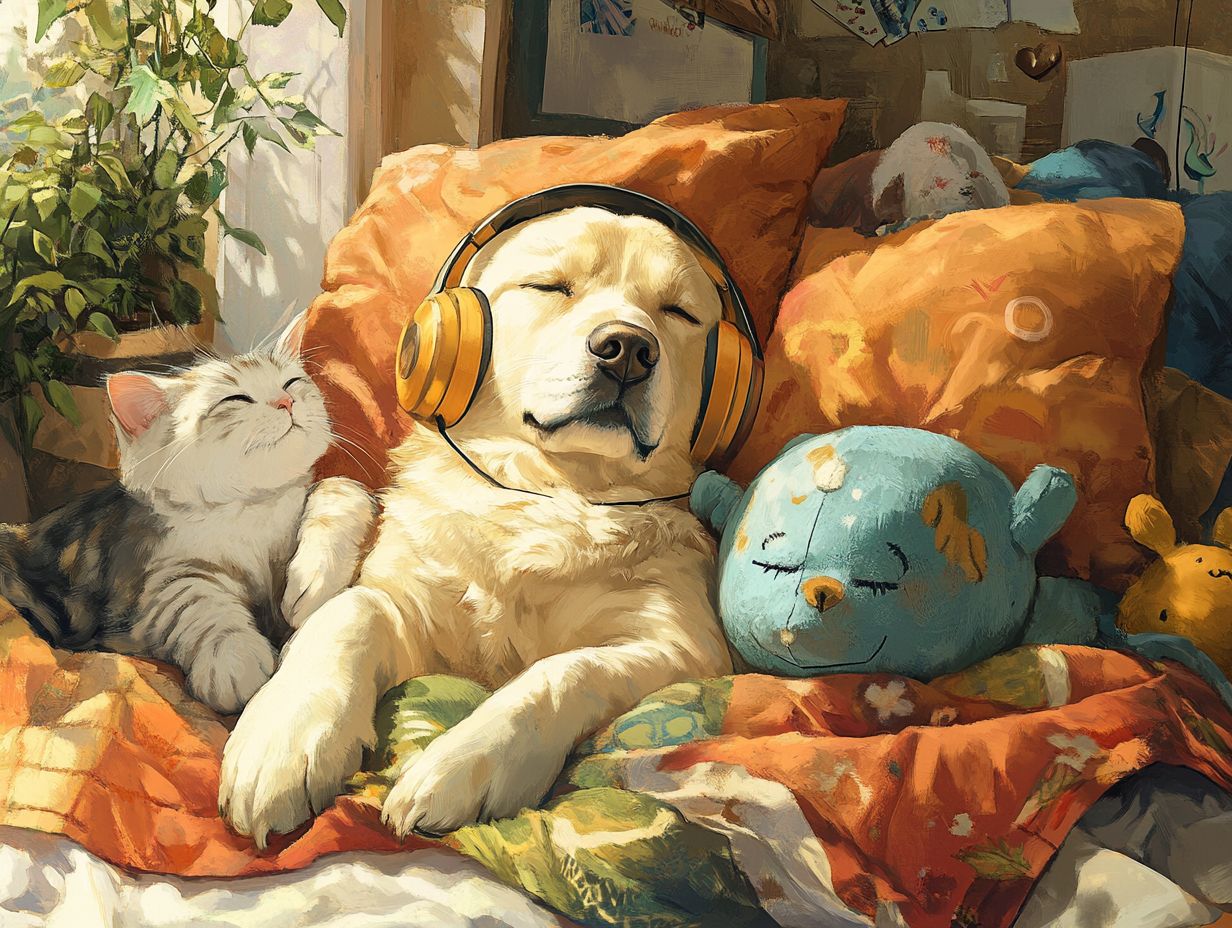
Employing distraction techniques, such as treat distractions, can be an invaluable strategy for you as a dog owner to divert your pet’s attention away from anxiety-inducing noises and stimuli.
By incorporating methods such as offering treat distractions or engaging in interactive play, you can assist your furry friend in developing more positive responses to unsettling situations. For instance, when a loud noise occurs, reaching for a favorite toy or a few tasty treats can effectively redirect your dog s focus.
Using positive reinforcement not only rewards your dog for engaging with the distraction but also strengthens their coping mechanisms. Over time, this approach fosters a sense of security and resilience, enabling your dog to navigate stressful conditions with greater ease.
Your best friend deserves to feel safe, and these techniques can make a real difference!
5. Consult with a Professional
Consulting with a professional dog trainer or veterinary behaviorist can provide you with invaluable insights into managing your dog s anxiety and crafting effective behavioral training strategies.
They can identify the specific triggers that cause stress, especially in cases of noise phobia, such as thunderstorms or fireworks. Professionals like veterinarians and trainers not only offer customized training techniques but also recommend therapeutic options, which may include behavioral modification plans or medications.
For example, trainers might use desensitization exercises (gradually exposing your dog to noise) to help them grow accustomed to scary sounds while ensuring the experience remains positive. Techniques like sound exposure through recordings can be beneficial. Meanwhile, veterinarians can guide you on potential medical interventions and nutritional support.
When combined, these approaches create a comprehensive plan that addresses both the emotional and physical well-being of your furry companion, enhancing pet wellness.
What Causes Pets to Become Anxious During Loud Events?
Understanding the causes of anxiety, like noise sensitivity, during loud events is essential for effective management. Factors such as past trauma or even genetic predispositions can make your dog particularly vulnerable to anxiety during events like fireworks on the Fourth of July.
Breeds like Labradoodles, celebrated for their social and friendly nature, may exhibit varying levels of anxious behavior influenced by their unique experiences and temperaments. While some dogs may appear relatively unfazed, others might show signs of distress, such as trembling or seeking refuge.
It s crucial to adopt tailored approaches to address anxiety, acknowledging that not all dogs respond similarly to calming techniques, including behavioral training. For example, your Labradoodle might thrive with a blend of desensitization and comforting methods, like creating safe spaces or playing soothing music.
In contrast, another breed may need more structured training sessions to help reduce fears during such noisy events, highlighting the importance of pet training.
How Do Loud Events Affect Pets?
Loud events can significantly affect your pets, often triggering signs of anxiety like howling, barking, or hiding, which clearly indicate their discomfort and stress, especially during fireworks or other noise events. It’s important to learn how to create a calm environment for anxious pets to help them feel safe.
These reactions aren t just quirky behaviors; they can signal deeper emotional turmoil. For instance, some pets might experience physical reactions, such as increased heart rates or changes in appetite, highlighting the importance of your vigilance.
Understanding these anxiety signs and behavioral cues is essential for guiding proactive measures to alleviate their distress. By recognizing early signs of anxiety, you can enable yourself to implement various coping strategies, like creating a safe space or utilizing calming products, including therapeutic treatments.
Act now! Recognizing these signs quickly can lead to faster relief for your furry friend.
What Are Some Common Signs of Anxiety in Pets?

Recognizing common signs of anxiety in your pets is crucial for timely intervention and support. Look for signs like trembling, excessive barking, or destructive behaviors such as chewing on furniture or digging.
These actions can signal that your furry friend feels overwhelmed during stressful incidents like fireworks. You might also see changes in their appetite or a tendency to withdraw from social interactions, indicating anxiety issues that need addressing.
Create a calming environment now it could make all the difference for your anxious pet! Consider soft classical music, a cozy bedding area, or soothing scents to significantly reduce anxiety levels.
Engaging in gentle, reassuring interactions helps build their confidence and comfort, especially for rescue dogs, during those troubling times.
What Are Some Other Ways to Calm Pets During Loud Events?
There are several effective methods to help calm your pets during loud events. Try using calming toys, like calming chews, and consider training your pet to handle loud noises as part of your approach.
Consider changing how your pet feels about loud noises by pairing them with something they enjoy, like treats. Gradually exposing your pet to recorded sounds at a low volume can also help them adapt to loud events, and making vet visits less stressful can further ease their anxiety.
By integrating these strategies into a comprehensive treatment plan, you can create a supportive environment for your furry companion. This holistic approach not only reduces anxiety but also equips your pets with coping mechanisms for future occurrences.
Combining multiple techniques will result in a more relaxed pet, fostering a deeper sense of security and well-being during stressful events.
Can Training Help with Calming Pets During Loud Events?
Training plays a pivotal role in soothing pets during loud events. It equips them with coping mechanisms while building their confidence through positive reinforcement. For additional strategies, check out 5 ways to improve your anxious pet’s quality of life.
Using various training methods can help your pets navigate stressful situations more effectively. Gradually exposing them to sounds or environments that trigger anxiety allows them to adapt over time.
Working alongside a professional dog trainer can significantly enhance these strategies. Their expertise allows them to tailor approaches specifically to your pet s individual needs, fostering a more serene and balanced behavior.
How Can Pet Owners Prepare for Future Loud Events?
Preparing for future loud events is essential for you as a pet owner. This proactive approach, along with implementing soundproofing tips for anxious pets, ensures your furry companions remain calm and secure during high-stress periods.
Consider designating a quiet retreat in your home where your pets can feel safe and comfortable. Stock this special area with their favorite toys, bedding, and treats to meet their needs amidst the chaos.
Anticipate your pet’s needs by scheduling breaks from the activity and sticking to their regular feeding and walking routines. By planning ahead, both you and your pets can enjoy a more peaceful holiday experience.
Frequently Asked Questions
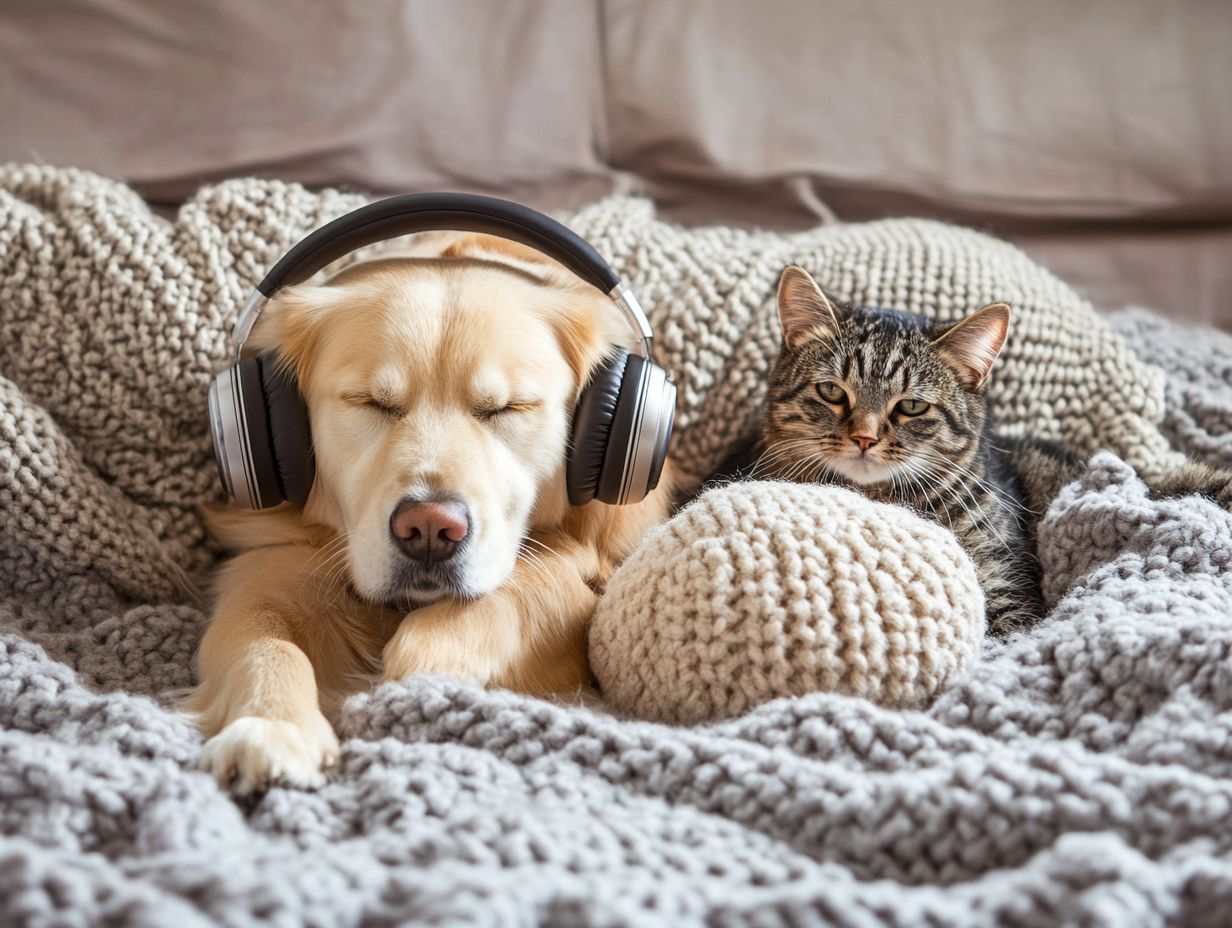
What are some common loud events that can cause anxiety in pets?
Some common loud events include thunderstorms, fireworks, construction noise, and loud music or parties. These noises can really startle our furry friends!
How can I prepare my pet for a loud event?
You can help your pet by gradually getting them used to loud noises. Start by playing recordings at a low volume and slowly increase it over time.
Make a safe and quiet space for your pet to retreat to during the event. This will help them feel secure! For additional tips on supporting your pet, check out how to comfort your pet during stressful events.
What are some natural remedies for calming pets during loud events?
Natural remedies to consider include special sprays that help calm pets, herbal supplements, and 5 ways to organize your home for anxious pets with calming music or white noise to mask the loud sounds.
Are there any training techniques that can help calm pets during loud events?
Yes! You can train your pet to connect loud noises with positive experiences by giving them treats or playing fun games during these events. This can really help reduce their anxiety in the long run!
What should I do if my pet is still anxious during a loud event?
If your pet is still anxious, stay calm and provide reassurance. It s essential to create a comforting atmosphere for them.
Don t hesitate to consult with a veterinarian for more solutions or medication if needed!
Can I use sedatives to calm my pet during a loud event?
While sedatives can work in some cases, it’s crucial to use them only under the guidance of a veterinarian. They might have side effects and may not be the best choice for long-term anxiety management.

